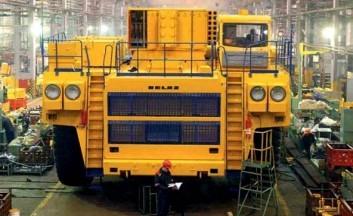Belarus industry felt the global crisis effects
 The situation has not changed
The situation has not changed

On April 25th MAZ and BelAZ representatives admitted there were problems with sales in foreign markets.
Belarusian goods exports are narrowly segmented by product group type. If important local market faces a problem then the overall economic performance in the country is deteriorating. The world economic crisis has reduced Russia’s investment activity, which in turn resulted in deteriorated performance of large Belarusian companies focused on the Russian market.
Belarus has a problem with poor diversification of her exports by commodity group and this problem has not been addressed for a long time. Major Belarus’ exports include petroleum products, dairy products, potash fertilizer and machinery. In January-February 2013 the share of petroleum products was 34.5% of the Belarusian exports, potash – 6.2%. The largest commodities in Mechanical Engineering were tractors and trucks – slightly over 5% of all exports. Together with the share of dairy products exports, these groups make up for 50% of the total Belarus’ merchandise exports.
In 2013, Belarusian Engineering industry faced with extremely unfavourable conditions. Many-fold decrease in trucks with limited capacity sales in the Russian market, without the capacity to re-orientate the supply to other foreign markets, resulted in overstocked warehouses. Industrial production in Zhodino (the main BelAZ production site) decreased by 37%, the region’s financial performance in terms of net income demonstrated a significant drop compared with 2012. The situation is similar at other machine-building enterprises. In the regions, local budgets are mainly formed by large enterprises therefore problems of enterprises have a direct impact on the economy – regional and national.
BelAz problems are associated with reduced coal prices – the trucks are used for transportation of the coal. The trend has affected all heavy machinery producers and the situation at BelAZ is a reflection of the global economic problems. MAZ felt increased competition in the Russian truck market as a result of the changed environmental standards applied to commercial vehicles, and due to general economic slowdown in Russia – an explicitly raw-materials based economy. Decreased energy prices and the world prices’ drop had a direct impact on the Russian economy and, consequently, Russia’s reduced demand for Belarusian products affected Belarus’ economy.
Thus, Belarus, not being a major raw materials supplier to the world market, is highly dependent on the energy prices and the world economy as a whole. The Belarusian government was unprepared for such a strong influence by the world processes on Belarusian economy and has not elaborated alternative scenarios with respect to further recession in Russia. Belarus needs to start readjusting its performance forecast for 2013, but de facto, the government will pretend the problem does not exist and will insist on fulfillment of performance indicators yet for a long while.
Subscribe to our newsletter




Situation in Belarus
Constitutional referendum: main consequences


 Video
Video
How to count the political prisoners: are the new criteria needed?


 Video
Video
Paternalism In Decline, Belarusian Euroscepticism, And The Influence Of Russia


 Video
Video












